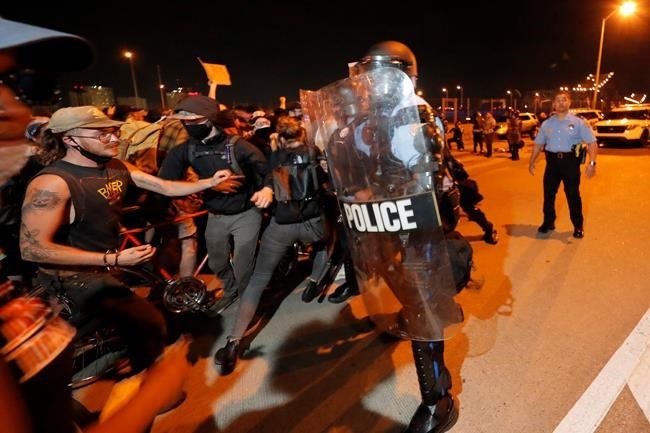
In this June 3, 2020, file photo, protesters breach a line of police atop the Crescent City Connection bridge, which spans the Mississippi River in New Orleans, during a protest over the death of George Floyd, who died May 25 after being restrained by police in Minneapolis. Douglas Brinkley, a Rice University history professor and author whose works include books about the late civil rights icons Rosa Parks and Dr. Martin Luther King Jr., discusses differences between the 1960s civil rights protests and those of today. He says the '60s protesters were fueled by Christian credos, while today's have more "raw anger." (AP Photo/Gerald Herbert, File)
June 23, 2020 - 10:33 PM
Douglas Brinkley, a Rice University history professor and author, whose works include books about the late civil rights icons Rosa Parks and Dr. Martin Luther King Jr., discusses differences between the 1960s civil rights protests and those of today:
Then: Protests fueled by Christian credos with a soundtrack of gospel music and spirituals.
Now: “More raw anger" in the streets, but with hip hop and other current music as the soundtrack.
Then: Nonviolence. King once was punched in the face on stage, took the blows, and urged that the white man not be charged.
Now: Protesters more militant, “no one's going to tolerate a punch in the face” without responding.
Then: Black demonstrators supported by white people opposed to the Vietnam War.
Now: Black demonstrators supported by others frustrated by the pandemic and economy.
Then: Civil rights leaders felt the sympathy of Presidents Lyndon B. Johnson and John F. Kennedy.
Now: President Donald Trump “mimics the language” of '60s white supremacists about protesters.
Then: Activists such as three young men, two of them white, murdered 56 years ago this week in Mississippi's Freedom Summer, could suddenly disappear.
Now: Social media and cellphones provide quick calls for help; cellphone cameras can make police abuses “go viral.”
News from © The Associated Press, 2020